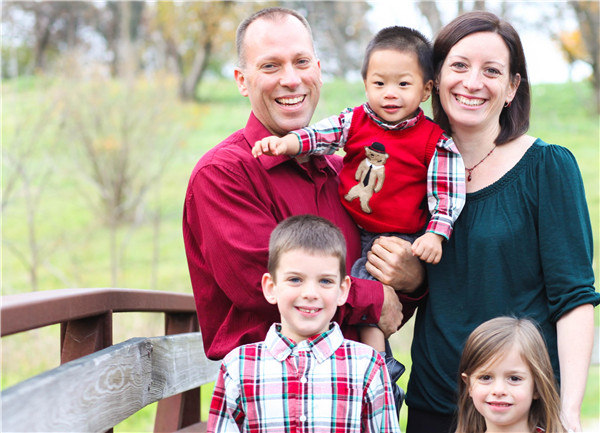Giving babies a chance at life
By Liu Wei,dai Ying, Lina Fromchina Features ( China Daily ) Updated: 2015-11-07 08:06:33
 |
|
Two year old Xiao Long (center) now lives with his foster family in America. [Photo Provided To China Daily] |
Liu, 41, has a son and a daughter. When he gets a call - even in the middle of the night - he rushes to a hospital to persuade parents not to abandon hope for their child.
But Liu says parents are not to blame. The expense of treating a severely disabled child can drive a family to ruin.
He told the father of a sick baby that one heart operation would cost 50,000 yuan. The father sighed: "I'm sorry, but my family is already 80,000 yuan in debt."
Liu once worked in a hospital in the United States, so he knows how China's healthcare system still lags behind.
Says Liu: "The social support system is more complete in the West. If a mother gives birth to an intellectually-impaired baby, the next day social workers will come to her home and offer help. On the third day charity groups will provide advice. She and her husband can go to work as welfare institutions will help to care for their baby.
"Parents in China don't know who to turn to and how to cope with a sick child. They end up with at least one parent leaving his or her job and attending to the baby at home."
That's why so many of China's disabled orphans are adopted by foreign families, adds Liu.
"To help families, surgeons cannot just perform surgery," says Liu. After doing many operations for free, Liu decided to join a more complex social support system.
In 2010, the Chunmiao Children's Aid Foundation (CF) was established.
"Love and professional care - both are needed" is Liu's motto. He is proud of his foundation team, which boasts 34 professional volunteers, all experts from the best departments of Beijing's renowned hospitals.
"Over the years, we haven't expanded our program. There are still 55 beds in the home. It's money-consuming and we need a huge investment. Also, I'm thinking of other ways to help the orphans," he says.
"Why do these premature orphans survive? Besides the hugs from their 'kangaroo mothers', they have breast milk from other volunteer mothers, which contain natural antibodies that help them grow better."
He recalls how, at first, a lorry driver collected the breast milk and stored it in a refrigerator. Now most volunteers bring the milk in themselves.
Theoretically, the average care time for a premature baby is six months, but most stay longer because the medical conditions at local children's homes are poor. While waiting to be adopted, some orphans join a foster family and start school.
Liu says orphans are an issue for all of society. His vision is that all children's homes will have a Little Flower program, not just for orphans, but for poor families.
"That may finally end the vicious circle of abandoning babies," says Liu.
|
|
|
|
|
|
|
|

























 Raymond Zhou:
Raymond Zhou: Pauline D Loh:
Pauline D Loh: Hot Pot
Hot Pot Eco China
Eco China China Dream
China Dream China Face
China Face






